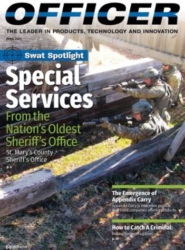A career in the field of criminal justice can be a rewarding endeavour for those who have a penchant for seeking justice. Ultimately, there are many pathways people can consider when pursuing a major, but the world of criminology in particular offers a variety of occupational options to those who want to make a difference.
While some jump directly into the role of law enforcement in the form of policing, there are many unique careers that help bring the guilty to justice. From police officers and investigators to lawyers, judges and reporters, not everybody puts their life on the line every day in order to prosecute and convict the guilty.
For those seeking a career in law enforcement, it’s important to highlight the options that exist. There are a variety of careers that complement the pursuit of justice, and with the proper training and certifications, finding the right role is easier than many may think.
Crime Scene Analyst/Investigator
At the scene of every major crime, experts are needed to sort through what happened, when it happened and what evidence exists to identify potential suspects. While police officers may exist to deter crime and/or ultimately bring in those suspected of committing wrongful acts, crime scene investigators and analysts help connect the dots. By uncovering what happened, law enforcement can more effectively prosecute successful and accurate cases.
Some of the major responsibilities of a crime scene analyst include:
• Tagging evidence
• Photographing or sketching key elements of the scene
• Gathering prints for analysis
• Utilising tools to collect bodily fluids for analysis
• Producing detailed written crime reports
Crime scene analysts pursue their careers through a criminal justice college criminology degree program. Earning a criminology degree online or at a physical campus usually takes a few years of enrolment, with an Honours BA being necessary to perform this role. Ultimately, most crime scene analysts earn anywhere from $45,000 to $60,000 per year.
Probation Officer
Not everybody who is convicted of a crime automatically goes to jail or prison – and many who do inevitably are released back into society. Monitoring the behaviour of those who have been released under specific conditions (probation) is a necessary component of the broader criminal justice system. As such, probation officers play a vital role in law enforcement.
Probation officers handle many tasks, including:
• Designing and implementing rehabilitation and treatment plans for probationers
• Communicating regularly with probationers and evaluating their progress
• Handling proper processes for probation violations
• Communicating with courts to ensure files, records and reports are received
Probation officers are decently paid when possessing advanced credentials, often earning more than the average salary. To fully realise earning potential as a probation officer, it is necessary to earn either a sociology, criminal justice or criminology degree online or from a local university.
Customs Officer
While crime and law enforcement are often considered within the context of local communities, crime on an international scale is also ever present. Every nation requires skilled law enforcement officials who are tasked with keeping its borders secure and its laws enforced – this is why a career as a customs officer is so essential to justice.
In Canada, the Canada Border Services Agency monitors more than 1,200 points of entry in every part of the country and at various international locations. According to the agency:
“The CBSA administers more than 90 acts, regulations and international agreements, many on behalf of other federal departments and agencies, the provinces and the territories”
Some of the major responsibilities of customs officers include:
• Enforcing laws regarding people, goods, plants and animals
• Detaining individuals who may pose a threat to the nation
• Collecting taxes and duties on various goods
• Intercepting illegal goods entering or leaving the country
• Ensuring all national and international trade agreements are followed
This vital role in day-to-day society may go unnoticed by many, but customs officers often are the first line of defence with respect to illegal goods and movement of people entering the country.
Corrections Officer
While crime scene investigators analyse acts of criminal activity, police officers arrest suspected criminals, and judges sentence those who are found guilty, what happens to those who are convicted?
Ultimately, these individuals must be watched over and maintained while incarcerated. This is where the value of corrections officers comes into the picture. These vital law enforcement officials ensure that the guilty serve their time, among other things.
What do corrections officers handle in their day-to-day jobs? Among other things:
• Enforcing rules within jails and prisons
• Supervising inmate activity to ensure safety and compliance
• Participating in rehabilitation roles to reduce recidivism
• Searching inmates for suspected contraband or illegal items
• Reporting regularly on the conditions and behaviour of inmates
While there are some corrections officer jobs that only require completing high school, many professional correctional system roles do require earning a criminal justice or criminology degree online or in-person from a university. With an Honours BA in one of these fields, a corrections officer can expect to earn $45,000 per year or more.
Forensic Psychologists
Analysing the behavioural patterns of criminals is a vital asset in apprehending suspects and better serving the law enforcement apparatus. While many law enforcement officials serve in a capacity that directly interacts with suspects, other roles may take a more indirect approach.
Forensic psychologists are one such example. According to Psychology Today:
“Forensic psychology is the interaction of the practice or study of psychology and the law. Psychologists interested in this line of applied work may be found working in prisons, jails, rehabilitation centres, police departments, law firms, schools, government agencies, or in private practice, to name a few.”
Some of the more common jobs that forensic psychologists perform include:
• Prison psychologists
• Criminal profilers
• Jury consultants
• Psychological investigators
Inevitably, breaking down the who and why of criminal behaviour is crucial. However, forensic psychologists can find themselves working in a variety of fields and occupations. A degree in psychology and/or criminology can pave the way for a career in this broader field.
While some may seek to be involved directly in the apprehension of criminals, not everybody wishes to be in the line of fire. These high-paying and vital law enforcement careers help ensure that the justice system is fair, balanced, thorough and effective.







